2005 Get Ticked-Off Tick Eradication Campaign
The Get-Ticked Off campaign is now complete, and from all reports it was a huge success. (See this note of thanks to Dr. Gerberding) We managed to raise close to $3000 and seven people donated 25K Delta skymiles to offset airfare costs. A married IHS couple opened their house to our participants, and USDA - Wildlife Services donated three trucks and gas. An orphan rickettsia CAN was located from 1999 and NCID kicked that into the pot as well. The smoke is still clearing on the vouchers, but it looks like we were able to provide 12 people and 60 work-days of effort to a needed public health campaign that will hopefully have significant impact in the years to come for a total programmatic cost of approximately $5000. In addition to our efforts on the ground, a collaborative scientific assessment was undertaken, and in time we will be able to determine the actual impact in terms of both disease reduction and tick abatement. Our volunteer efforts should also have an impact upon reduction of Hantavirus and West Nile Virus as well as Rocky Mountain spotted fever- as all these diseases are present in the impacted community.
In addition to providing a philanthropic service that had public health implications, we were also able to provide invaluable mentoring services to four new CDC personnel who had never been involved in a community response. The community hired a number of members to work with us, and our crew was also augmented by a CDC Experience Fellow, and an MPH student from BYU. All of these people got to see PHAs in action, and they hopefully all have a greater understanding of how PHAs help CDC attempt to help people live healthier lives. At the same time, our members got to work with local community volunteers, tribal employees, IHS, USDA other CDC personnel and more. It was a true win-win for all involved.
This intervention was also a success in that it allowed us to involve our retirees in a public health response. This took more effort than initially thought, and wouldn't have happened without the acute support, commitment and involvement of Joe Foster in the Office of General Counsel, but in the end we were able to initiate Voluntary Service Agreements through the CDC Foundation which permitted our retired members to participate without personal exposure to risk and liability. They were compensated a well-earned $1 for their efforts and in addition to their labor they also contributed heavily to the mentoring aspects of our involvement.
Thanks to all of you who supported this campaign through either time, money, miles or spirit. The impacted community could not have been more appreciative. Our efforts, combined with those of other participants resulted in approximately 1000 truck loads of debris getting hauled to the land-fill, the placement of over 2500 tick collars on local dogs ("tick busses"), the assessment of 130+ homes for tick prevalence, the initiation of pesticide application to infested communities and a raised local public awareness. Most importantly, Rocky Mountain spotted fever has taken the lives of children in the community. Only time will tell, but hopefully our work has saved the lives of children- our greatest desire. Again, thanks to all of you who helped us make this happen. This was a remarkable success for the Watsonian Society and we should all share the pride of our success.
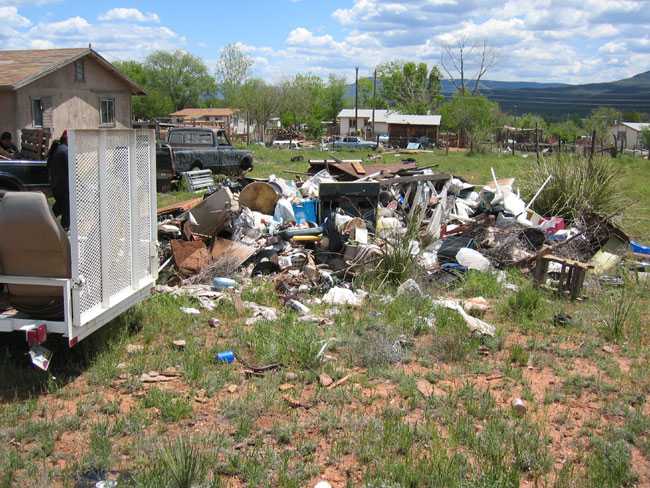
A common site, and a potential harbor of disease. The Watsonians spent the week assisting local volunteers with clearing mini-landfills such as these. Photo by Robert Swain
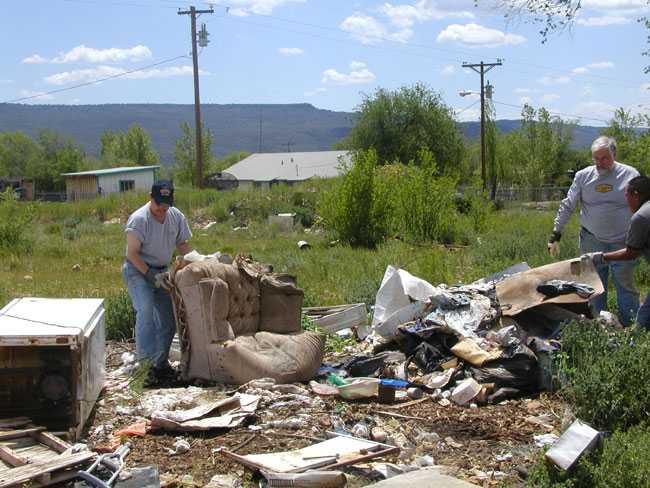
David Byrum and Frank Ceo clear a backyard of debris. This particular pile ultimately took over 6 trucks to clear.
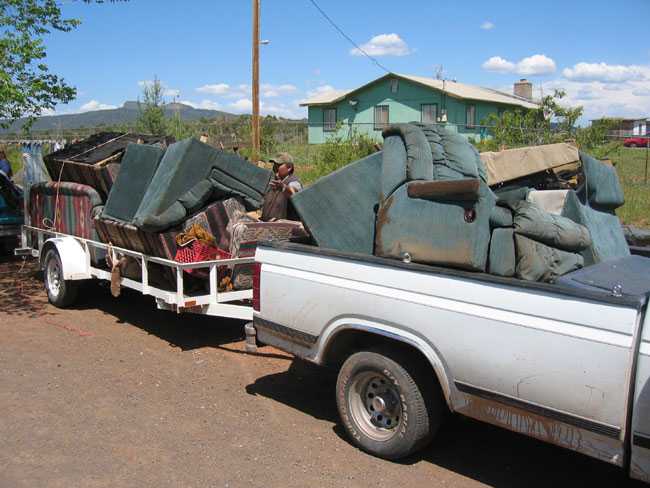
Another load, ready to go. Photo by Robert Swain
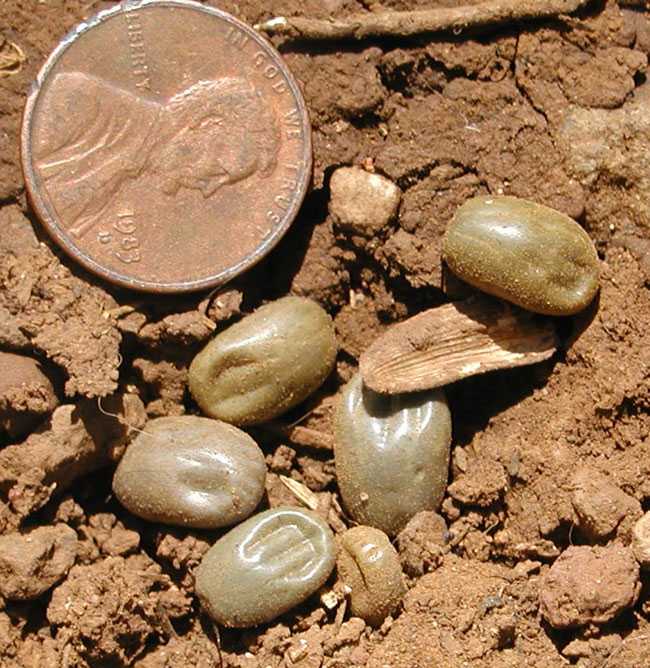
The main event. These are engorged ticks, and each will give birth to approximately 5000 ticks. These particular ticks were protected by a couch stored in a residents backyard.
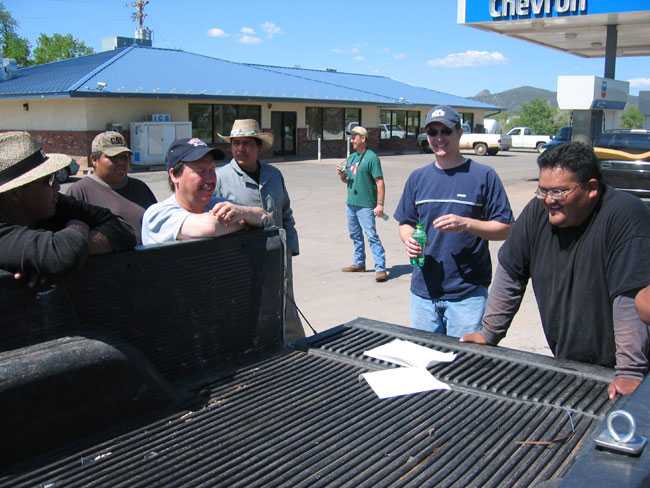
David Byrum and community volunteers review a local map during lunch break. Photo by Robert Swain.
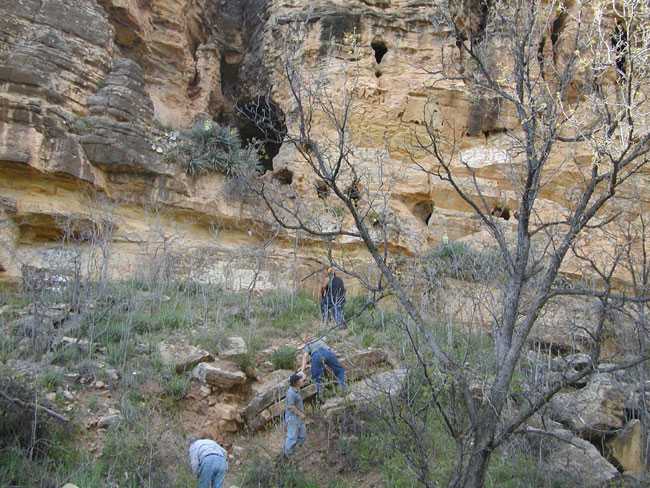
It wasn't all work. These Watsonians were taken on an after-hours field trip by one of the local volunteers to visit Geronimo's caves. During the Indian Wars Geronimo hid his men and horses in a series of interconnected caves in the region.
Page last updated February 28, 2011
The contents of the Web site or communication of employee association information through other government resources does not constitute or imply endorsement of the operations and activities of the association by CDC or the U.S. Department of Health and Human Services.

